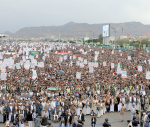You are here
Tunisia election tests transition from autocracy to democracy
By Reuters - Oct 22,2014 - Last updated at Oct 22,2014
HAMMAM SOUSSE, Tunisia — Blaring music and flags fill the hall where Tunisia's Initiative Party is warming up to test its chances in the second free election since the 2011 "Arab Spring" uprising that ousted autocrat Zine Al Abidine Ben Ali.
The party's Eagle crest may be from the post-revolutionary era, but symbols from the past dominate its campaign for Sunday's parliamentary vote, where Ben Ali's old guard are hoping to make a comeback.
Three ex-Ben Ali ministers take to the stage in the hall in the resort town of Sousse, stalwarts from his disbanded RCD party mingle with Initiative neophytes, and even one of the songs is a classic from Ben Ali rallies.
No-one represents this comeback more than Initiative Party chieftain and presidential candidate, Kamel Morjane, a Ben Ali-era foreign minister and defence minister who started his own party and clambered back into politics.
Rather than illustrating the failings of Tunisia's 2011 revolt, the return of some of the old Ben Ali elite like Morjane may say more about what the North African country got right where other Arab Spring nations went wrong.
Four years after street protests forced Ben Ali and his entourage to flee into Saudi Arabian exile, driven out by anger over corruption and repression, Tunisia's election is one last step along a shaky path from autocracy to democracy.
While in other Arab Spring nations, from Libya, Yemen to Syria, the gun still rules, Tunisian political adversaries have reconciled with the past, approved a new constitution and worked out compromises between once bitter rivals.
"If there is a chance of a government of national unity, then I am all for it," Morjane said after his party's Sousse event. "Just as we don't want to be excluded, we will not exclude anyone else. We can take the lessons from the past."
Sunday's parliamentary vote will elect the 217-member assembly, and that will chose a new prime minister to lead the government to replace Tunisia's caretaker administration. Presidential elections will follow next month.
Coalition horse-trading has become the hallmark of Tunisia's post-revolutionary politics, and with major parties not expected to win a clear majority, a national unity government may be the most likely outcome on Sunday.
The stability afforded by a unity government may be what is needed for a still fragile nation. Tunisia's new rulers must create jobs and cut public spending without disaffecting the many Tunisians who have yet to see any economic benefits of democracy.
But democracy also opened the way to the rise of hardline Islamists once oppressed under Ben Ali. Extremist militants now challenge the security forces and Tunisian fighters constitute one of the largest blocks of jihadis heading to Syria.
"The consolidation of a successful democracy in the country would be a powerful signal that reform and political pluralism are not doomed to fail in the Arab world," said Anthony Dworkin in a European Council on Foreign Relations report on the elections.
Shaky transition
Nowhere is Tunisia's deal-making clearer than between the two strongest electoral contenders, two parties on opposite sides of the political spectrum on questions such as the role of Islam in politics but which eventually reached a compromise.
Nidaa Tounes, led by Beji Caid Essebsi, an octogenarian former parliament speaker under Ben Ali, faces off against the Islamist movement Ennahda, whose leadership were exiled in Europe or spent years in prison under the former autocrat.
After the 2011 revolution, Ennahda won most seats in the first free election and formed a coalition government with two secular parties. But disputes over hardline Islam and the murder of two opposition leaders blew up into a political crisis.
After months of protests, and following the army's overthrow of an Islamist president in Egypt, Ennahda ceded power at the start of the year to a transitional government after a deal with secular opponents brokered by Tunisia's powerful trade unions.
Crucially, Ennahda proved more flexible than Islamist movements elsewhere, and it accepted the return of former Ben Ali officials into politics. Prominent former regime officials were excluded from Tunisia's first election.
The country's new constitution, praised as the region's most progressive, has also helped resolve divisive questions of politics and religion.
"Tunisia managed to differentiate itself, and made its way through. It's marked by this inclusiveness," said one Western diplomat. "One of the products is that everyone here has a place in the political context."
Jobs, costs and security
If three years ago, during the first free election, bitter disputes over the role of Islam and Tunisian identity characterised political debate, voters are now focussed on jobs, economic opportunities, the high cost of living, and security.
Nostalgia among some Tunisians for the pre-revolutionary days of better security and economic stability may benefit parties such as Nidaa Tounes and movements led by former regime officials now positioning themselves as untainted by Ben Ali-era corruption and abuse.
Known as the "remnants", former Ben Ali officials are portraying themselves as the men who have the technical skills to tackle Tunisia's economic woes and secure the international help it needs to battle militants.
Since it was forced from power, Ennahda has branded itself as a party that has learned from its mistakes in government, after criticism of its handling of the economy and its lax attitude toward hardliners.
Led by once exiled leader Rached Ghannouchi, Ennahda has decided it will not run in the presidential vote, but focus on the legislature to push for a national alliance that will help Tunisia consolidate its political gains.
Campaigning in a gritty Tunis district of garage workshops, former prime minister Ali Larayedh this week came face to face with the economic realities facing Tunisia's working classes in a neighbourhood where many backed his party in the past.
Larayedh, an Ennahda stalwart and former Ben Ali-era political prisoner who spent more than a decade in jail, was greeted repeatedly on the campaign trail by young men clamouring for jobs and better economic opportunities.
"We cannot do this by ourselves even if we have a majority," said Ennahda adviser Lotfi Zitoun. "We need to bring in as many other parties as possible."
Related Articles
At Tunis airport arrivals terminal last month, hundreds of Tunisians gathered waving flags to greet a special guest — not a sports legend or popstar, but a former minister from ousted President Zine Al Abidine Ben Ali's government.
SOUSSE, Tunisia — Former Tunisian president Moncef Marzouki has warned of a "catastrophic" situation in his country, plagued by poverty and
TUNIS — Thirty lawmakers from Tunisia's ruling party suspended their membership on Wednesday and threatened to resign in protest over what t
















